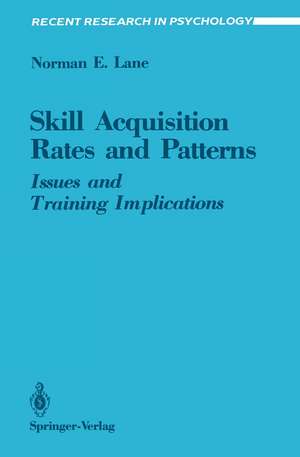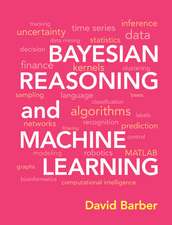Skill Acquisition Rates and Patterns: Issues and Training Implications: Recent Research in Psychology
Autor Norman E. Laneen Limba Engleză Paperback – sep 1987
Din seria Recent Research in Psychology
- 15%
 Preț: 632.37 lei
Preț: 632.37 lei -
 Preț: 379.86 lei
Preț: 379.86 lei - 15%
 Preț: 637.13 lei
Preț: 637.13 lei -
 Preț: 377.73 lei
Preț: 377.73 lei - 15%
 Preț: 631.40 lei
Preț: 631.40 lei -
 Preț: 382.36 lei
Preț: 382.36 lei - 15%
 Preț: 635.65 lei
Preț: 635.65 lei - 15%
 Preț: 642.36 lei
Preț: 642.36 lei -
 Preț: 392.60 lei
Preț: 392.60 lei - 15%
 Preț: 637.59 lei
Preț: 637.59 lei - 15%
 Preț: 635.65 lei
Preț: 635.65 lei - 15%
 Preț: 634.49 lei
Preț: 634.49 lei - 15%
 Preț: 645.47 lei
Preț: 645.47 lei - 20%
 Preț: 440.21 lei
Preț: 440.21 lei - 15%
 Preț: 653.33 lei
Preț: 653.33 lei - 5%
 Preț: 712.60 lei
Preț: 712.60 lei - 15%
 Preț: 634.68 lei
Preț: 634.68 lei - 18%
 Preț: 950.96 lei
Preț: 950.96 lei - 15%
 Preț: 639.59 lei
Preț: 639.59 lei - 15%
 Preț: 634.00 lei
Preț: 634.00 lei - 15%
 Preț: 636.80 lei
Preț: 636.80 lei - 18%
 Preț: 724.00 lei
Preț: 724.00 lei - 15%
 Preț: 642.18 lei
Preț: 642.18 lei - 15%
 Preț: 635.15 lei
Preț: 635.15 lei - 15%
 Preț: 639.08 lei
Preț: 639.08 lei - 15%
 Preț: 638.76 lei
Preț: 638.76 lei - 15%
 Preț: 640.55 lei
Preț: 640.55 lei - 15%
 Preț: 637.28 lei
Preț: 637.28 lei - 15%
 Preț: 630.57 lei
Preț: 630.57 lei - 15%
 Preț: 636.80 lei
Preț: 636.80 lei - 15%
 Preț: 638.57 lei
Preț: 638.57 lei - 15%
 Preț: 633.02 lei
Preț: 633.02 lei - 15%
 Preț: 647.08 lei
Preț: 647.08 lei - 15%
 Preț: 638.43 lei
Preț: 638.43 lei - 15%
 Preț: 649.71 lei
Preț: 649.71 lei - 15%
 Preț: 637.93 lei
Preț: 637.93 lei - 15%
 Preț: 634.18 lei
Preț: 634.18 lei - 15%
 Preț: 632.37 lei
Preț: 632.37 lei -
 Preț: 376.80 lei
Preț: 376.80 lei - 15%
 Preț: 644.18 lei
Preț: 644.18 lei - 15%
 Preț: 640.55 lei
Preț: 640.55 lei - 15%
 Preț: 637.78 lei
Preț: 637.78 lei -
 Preț: 377.57 lei
Preț: 377.57 lei - 15%
 Preț: 635.15 lei
Preț: 635.15 lei - 18%
 Preț: 946.87 lei
Preț: 946.87 lei - 15%
 Preț: 647.27 lei
Preț: 647.27 lei - 15%
 Preț: 633.53 lei
Preț: 633.53 lei
Preț: 634.18 lei
Preț vechi: 746.09 lei
-15% Nou
Puncte Express: 951
Preț estimativ în valută:
121.35€ • 127.06$ • 100.65£
121.35€ • 127.06$ • 100.65£
Carte tipărită la comandă
Livrare economică 09-23 aprilie
Preluare comenzi: 021 569.72.76
Specificații
ISBN-13: 9780387965796
ISBN-10: 0387965793
Pagini: 143
Ilustrații: XXII, 143 p.
Dimensiuni: 155 x 235 x 9 mm
Greutate: 0.25 kg
Ediția:Softcover reprint of the original 1st ed. 1987
Editura: Springer
Colecția Springer
Seria Recent Research in Psychology
Locul publicării:New York, NY, United States
ISBN-10: 0387965793
Pagini: 143
Ilustrații: XXII, 143 p.
Dimensiuni: 155 x 235 x 9 mm
Greutate: 0.25 kg
Ediția:Softcover reprint of the original 1st ed. 1987
Editura: Springer
Colecția Springer
Seria Recent Research in Psychology
Locul publicării:New York, NY, United States
Public țintă
ResearchCuprins
Summary.- Background and Requirement.- Objectives.- Domain of Analyses.- Approach.- Initial Directions.- Modifying Approach and Emphasis.- Emphasizing Retention and Transfer.- Emphasizing Processes of Acquisition.- Acquisition Curves, Shapes and Parameters.- Basic Parameters.- The Nature of Acquisition Functions.- Comparative Analysis of Acquisition Functions.- Conditions that Affect Curve Shape.- Group vs. Individual Curves.- Behavioral vs. Engineering Approaches.- Some Relevant Theory and Findings on Acquisition.- The Nature of Skilled Performance.- Distinctions Between Skills and Abilities.- Stages and Phases of Learning.- Development of “Automatic” Behavior.- Schema Theory Explanations of Acquisition.- Contextual Interference.- Knowledge of Results and Feedback.- Part-Task and Task Simplification Approaches.- Prediction of Time to Train.- Retention.- Issues in Task and Skill Classification.- Generalizations and Discussion.- Overview.- Generalizations from the Data.- Generalizations About the Data.- Conclusions.- Mechanisms for Improvement.- Overview.- 1. Collection and use of Training data.- 2. More Flexibility in Training Time and Scheduling.- 3. Programs for Refresher Training.- 4. R&D on Task and Skill Description Systems.- References.
















